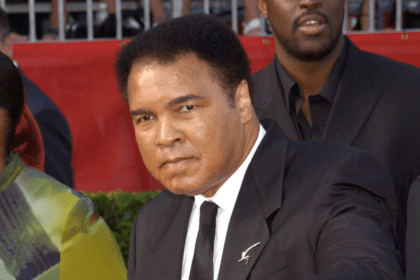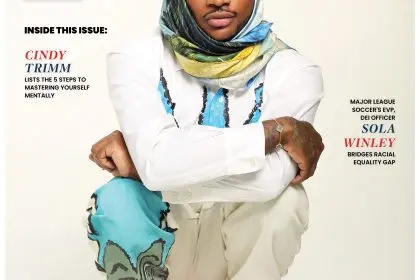
10 inspiring moments from Muhamad Ali’s Janazah and memorial service
When it was announced that Muhammad Ali had died at the age of 74, the self-proclaimed “Greatest of All Time” “shook up the world,” again. The man who stood up for himself, his race, and an entire generation transitioned physically, but his spirit and legacy will always live.
During his Janazah (Muslim funeral) and memorial in Louisville, Kentucky, thousands paid tribute. Here are 10 inspiring moments from Muhammad Ali’s Janazah and memorial service.
The overall lesson
Muhammad Ali once said that he was “bigger than boxing.” It was a true statement that reveals how he allowed himself to be greater than expectations. He was more than an athlete, he was a leader, humanitarian, and a father. There is always room to destroy limitations.
The notable faces who paid their respects
Prominent figures from around the world paid tribute to Ali. Valerie Jarrett, Louis Farrakhan, Will Smith, Mike Tyson, President Clinton, Billy Crystal, Jesse Jackson, Bernard Hopkins, Turkish President Recep Tayyip Erdogan, and King Abdullah II of Jordan were all in attendance.
 The thousands who attended
The thousands who attended
Over 30,000 people paid tribute to Ali at his Janazah and memorial service. His Janazah was the largest Muslim ceremony on American soil.
The inspirational words
Ali was known to inspire through words and actions. He became a champion because he trained like a champion inside and outside of the boxing ring.

The hip-hop influence
Muhammad Ali may be the greatest influence on hip-hop. His impromptu rhymes were a form of rap freestyle decades before rap became prominent. Inspired by Ali, rapper Lupe Fiasco attended Ali’s memorial.
The poetry of Muhammad Ali
Muhammad Ali often wrote poetry. Inside the museum, several of Ali’s poems and short essays were featured. He was a gifted storyteller.
 The Olympic torch
The Olympic torch
The Olympic torch is featured in the museum inside the Muhammad Ali Center. During the 1996 Olympics in Atlanta, Ali lit the torch in a moment that proved that he was the Greatest of All Time and touched lives around the world.
The memorial at the Muhammad Ali Center
The memorial outside the Muhammad Ali Center featured a large tribute to Ali as flowers, photos, and paintings were on view for his visitors to pay respects.
 The memories of Ali’s childhood home
The memories of Ali’s childhood home
We captured the essence of Muhammad Ali’s childhood home, which is located in the West End section of Louisville. A memorial was set up outside the home as hundreds stopped by to pay tribute. The home has since become a museum and tells the story of Ali’s childhood with photos, paintings and a documentary.
The strength of Ali’s family
On the day of Muhammad Ali’s Janazah, his family members stood strong. They all held their heads high and often smiled as kind words were being said about the late-great Ali. It was a testament to Ali, who often gave the world inspirational words and remained strong during the darkest periods.
Laila Ali stands strong at Muhammad Ali’s Janazah

Thousands from around the world gathered to pay tribute Muhammad Ali at his Janazah. Held at Kentucky’s Freedom Hall, more than 14,000 people attended, making it the largest Janazah ever on American soil.
Ali’s family and close friends were positioned in a section to the right of the main podium. Since her father’s death, Laila Ali has been vocal about the pain she and her family endured as Ali grew older.
“I personally have been sad for a long time. My father has been struggling with Parkinson’s disease for many years, and it wasn’t easy to watch him suffer through the years. So, knowing that he’s not suffering anymore is what gives me comfort. I’ve prepared mentally for many years, that obviously one day I was going to lose my father, and that time has come. And I think that the whole world is sad. I don’t feel alone. It’s not just our family, it’s the whole world,” Laila Ali said during a recent interview on the “Today” show.
But on the day of Ali’s Janazah, Laila stood strong. While surrounded by her husband Curtis Conway and their two children, Laila held her head high and often smiled as kind words were being said about her father. It was a testament to her beloved father’s legacy of strength and courage throughout his life that Laila remained stalwart during what was surely one of the most difficult periods of her life.
How White media is attempting to strip Muhammad Ali of his Blackness

The death of another legend has provoked dialogue on how Blacks are viewed by mainstream media and some Whites in America. Once it was announced that Muhammad Ali had transitioned, a multitude of stories and tweets were published regarding Ali’s ability to transcend race and religion.
On NBC News, writer Jon Schuppe wrote, “Ali was an anti-establishment showman who transcended borders and barriers, race and religion.”
On The Star-Ledger, Jerry Izenberg wrote, “a constituency that transcended all economic, racial, ethnic and political barriers.” Izenberg also called the Nation of Islam, “a group that was more Afrocentric cult than religion.”
The gist of such flawed arguments suggests that Ali was above being Black and Muslim. Some view being Black and accepting a religion that is different from Christianity as a handicap or detrimental. To believe that someone transcends race or religion is to believe that they found acceptance within the mainstream while carrying a deficiency.
A similar argument was made after Prince died in April. Some publications wrote that Prince and his music transcended race as if Whites haven’t always gravitated to Black music such as the blues, jazz, R&B and even hip-hop. Other publications, such as The Independent, called Prince, “mixed-race.” It was a disturbing revelation of how some Whites seek to detach successful Blacks from their race and culture. It reinforces racism by conveying a message that Whites are only comfortable with Blacks if they can exhibit an elite skill or talent.
But just like Prince, Ali never viewed his own race or religion as a shortcoming. He was a man who stood tall in the midst of criticism and embraced being Black and Muslim. He always accepted himself, but it took decades for others to give him the acceptance that he always deserved. In order to continue to grant him that respect, understand that his race and religion defined him more than his spectacular feats in the boxing ring.
Story by Amir Shaw
Illustration by Kareem Kenyada




